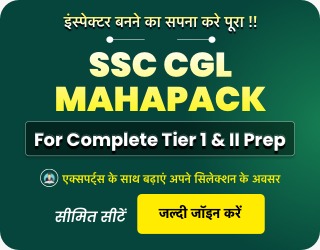Table of Contents
The Indian Institute of Banking and Finance (IIBF) is going to conduct the JAIIB Exam 2025 in May and November 2025. In this article, JAIIB Syllabus 2025 will be their guiding light to keep a check on their preparation. The following topics are covered in the JAIIB Exam:
1. Indian Economy & Indian Financial System
2. Principles & Practices of Banking
3. Accounting & Financial Management for Bankers
4. Retail Banking & Wealth Management
JAIIB Syllabus 2025
IIBF conducts the JAIIB Exam 2025 which stands for Junior Associate of Indian Institute of Bankers Exam. The JAIIB Syllabus is a crucial part of the preparation as it includes all the subjects and topics the candidates need to prepare for the upcoming examination. According to the syllabus and exam pattern of JAIIB, there are a total of 4 subjects and each subject is 100 marks. There is no negative marking in the exam. While appearing in the examination, the candidates must be very mindful as the negative marking can affect their total score in the final selection.
JAIIB Syllabus and Exam Pattern 2025
For more details related to the JAIIB Syllabus and Exam Pattern 2025, the candidates can refer to the table mentioned below.
| JAIIB Syllabus 2025 | |
| Organization | Indian Institute of Banking and Finance |
| Exam Name | JAIIB Exam 2025 |
| Selection Process | Online Exam |
| Language of Exam | English |
| JAIIB Exam Date 2025 | May Session: 4th, 10th, 11th, and 18th May 2025
November Session: 2nd, 8th, 9th, and 16th November 2025 |
| Subjects |
|
| Negative Marking | None |
| Mode of Exam | Online |
| Official Website | www.iibf.org.in |
JAIIB Exam Pattern 2025
- The exam is conducted on different dates for each subject.
- Each subject contains 100 multiple-choice questions (MCQs).
- There is no negative marking for incorrect answers.
- The total exam duration is 2 hours per subject.
- The JAIIB Examination is conducted online only.
- Each subject carries a total of 100 marks.
| JAIIB Exam Pattern 2025 | ||||
| Papers | Name of Paper | Questions | Marks | Duration |
| I | Indian Economy & Financial System | 100 | 100 | 2 hours |
| II | Accounting & Financial Management of Banking | 100 | 100 | 2 hours |
| III | Principles & Practices of Banking | 100 | 100 | 2 hours |
| IV | Retail Banking & Wealth Management | 100 | 100 | 2 hours |
JAIIB Exam Syllabus 2025 (Detailed)
As per the revised JAIIB Syllabus 2025, there are four papers in the IIBF JAIIB Exam. The subjects included in these four papers are mentioned below:
Paper 1: Indian Economy and Indian Financial System (IE & IFS)
Paper 2: Principles and Practices of Banking (PPB)
Paper 3: Accounting and Financial Management for Bankers (AFM)
Paper 4: Retail Banking and Wealth Management (RBWM)
JAIIB Syllabus Paper 1: Indian Economy and Indian Financial System (IE & IFS)
The initial module of the updated JAIIB Syllabus 2025 is focused on the Indian Economy and the Indian Financial System. The JAIIB Paper 1 Syllabus comprises four modules, which are as follows: Indian Economic Architecture, Economic Concepts Related to Banking, Indian Financial Architecture, and Financial Products and Services. Below are the topics covered in each module.
Module A: Indian Economic Architecture
- An Overview of the Indian Economy
- Sectors of the Indian Economy
- Economic Planning in India & NITI Aayog
- Role of Priority Sector and MSME in the Indian Economy
- Infrastructure including Social Infrastructure
- Globalization- Impact on India
- Economic Reforms
- Foreign Trade Policy
- Foreign Investments and Economic Development
- International Economic Organizations (World Bank, IMF, etc.)
- Climate Change
- Sustainable Development Goals (SDGs)
- Issues Facing the Indian Economy
Module B: Economic Concepts Related to Banking
- Fundamentals of Economics
- Microeconomics and Macroeconomics
- Types of Economies
- Supply and Demand
- Money Supply and Inflation
- Theories of Interest
- Business Cycles
- Monetary Policy and Fiscal Policy
- System of National Accounts and GDP Concepts
- Union Budget.
Module C: Indian Financial Architecture
- Indian Financial System – An Overview
- Indian Banking Structure
- Banking Laws – Reserve Bank of India Act, 1934 & Banking Regulation Act, 1949
- Development Financial Institutions
- Micro Finance Institutions
- Non-Banking Financial Companies (NBFCs)
- Insurance Companies
- Indian Financial System – Regulators and Their Roles
- Reforms & Developments in the Banking Sector.
Module D: Financial Products and Services
- Financial Markets
- Money Markets
- Capital Markets and Stock Exchanges
- Fixed Income Markets – Debt and Bond Markets
- Foreign Exchange Markets
- Interconnectedness of Markets and Market Dynamics
- Merchant Banking Services
- Derivatives Market
- Factoring, Forfaiting, and Trade Receivables Discounting System (TReDS)
- Venture Capital
- Lease Finance and Hire Purchase
- Credit Rating and Credit Scoring
- Mutual Funds
- Insurance Products
- Pension Products
- Para Banking and Financial Services Provided by Banks
- Real Estate Investment Trusts (REITs) and Infrastructure Investment Trusts (InvITs).
JAIIB Syllabus Paper 2: Principles and Practices of Banking (PPB)
The second paper in the JAIIB Syllabus is titled “Principles and Practices of Banking.” PPB consists of four modules, namely General Banking Operations, Functions of Banks, Banking Technology, and Ethics in Banks and Financial Institutions. Below, we have provided a list of topics covered in each module for Paper 2.
Module A: General Banking Operations
- Banker-Customer Relationship
- AML-KYC Guidelines
- Operational Aspects of KYC
- Opening Accounts of Various Types of Customers
- Operational Aspects of Deposit Accounts
- Operational Aspects of Handling Clearing/Collection/Cash
- Banker’s Special Relationship
- Foreign Exchange Remittance Facilities for Individuals
- Operational Aspects of NRI Business
- Foreign Currency Accounts for Residents and Other Aspects
- Cash Management Services and its Importance
- Payment and Collection of Cheques and Other Negotiable Instruments
- Responsibility of Paying Bank
- Responsibility for Collecting Bank
- Ancillary Services
- Financial Inclusion & Financial Literacy
- Customer Service Guidelines
- Duties & Rights of a Banker and Customer Rights
- Grievance Redressal & RBI Integrated Ombudsman Scheme 2021
- The Consumer Protection Act, 2019: Preamble, Extent, and Definitions
- The Right to Information Act, 2005.
Module B: Functions of Banks
- Principles of Lending
- Different Types of Borrowers and Types of Credit Facilities
- Appraisal and Assessment of Credit Facilities
- Operational Aspects of Loan Accounts
- Types of Collaterals and Their Characteristics
- Different Modes of Charging Securities
- Documentation
- Non-Performing Assets/ Stressed Assets
- Important Laws Relating to Recovery of Dues
- Contracts of Indemnity, Contracts of Guarantee & Bank Guarantee
- Letters of Credit
- Deferred Payment Guarantee
- Laws Relating to Bill Finance
- Personal Finance
- Priority Sector Advances
- Agricultural Finance
- Finance to MFIs/Co-Lending Arrangements with NBFCs
- Micro, Small, and Medium Enterprises in India
- Government Sponsored Schemes
- Self-Help Groups.
Module C: Banking Technology
- Essentials of Bank Computerisation
- Operational Aspects of the CBS Environment
- Alternate Delivery Channels – Digital Banking
- Data Communication Network and EFT Systems
- Digital Payment Systems – NPCI
- Impact of Technology Adoption and Trends in Banking Technology
- Security Considerations and Mitigation Measures in Banks
- Operational Aspects of Cyber Crimes/Fraud Risk Management in Cyber Tech
- Technology Trends in Banking
- e-RUPI
- Fintech – RegTech, SupTech, Hashtag Banking.
Module D: Ethics in Banks and Financial Institutions
- Ethics, Business Ethics & Banking: An Integrated Perspective
- Ethics at the Individual Level
- Ethical Dimensions: Employees, Work Ethics, and the Workplace
- Banking Ethics: Changing Dynamics.
JAIIB Syllabus Paper 3: Accounting and Financial Management for Bankers (AFM)
The JAIIB Syllabus 2025 includes Paper 3, which is titled “Accounting and Financial Management for Bankers” (AFM). This paper is divided into four modules: Accounting principles and processes, financial statements & core banking systems, financial management, and taxation & fundamentals of costing. Below, candidates can find the topics covered in each module for AFM.
- Module A: Accounting Principles and Processes
- Definition, Scope & Accounting Standards including Ind AS
- Basic Accountancy Procedures
- Maintenance of Cash/Subsidiary Books and Ledger
- Bank Reconciliation Statement
- Trial Balance
- Rectification of Errors and Adjusting & Closing Entries
- Depreciation and its Accounting
- Capital and Revenue Expenditure
- Bills of Exchange
- Operational Aspects of Accounting Entries
- Back Office Functions/Handling Unreconciled Entries in Banks
- Bank Audit & Inspection
- Module B: Financial Statements and Core Banking Systems
- Balance Sheet Equation
- Preparation of Final Accounts
- Company Accounts-I
- Company Accounts-II
- Cash Flow and Funds Flow
- Final Accounts of Banking Companies
- Core Banking Systems and Accounting in a Computerised Environment
- Module C: Financial Management
- Financial Management – An Overview
- Ratio Analysis
- Financial Mathematics Calculation of Interest and Annuities
- Financial Mathematics Calculation of YTM
- Financial Mathematics – Forex Arithmetic
- Capital Structure and Cost of Capital
- Capital Investment Decisions/Term Loans
- Equipment Leasing/Lease Financing
- Working Capital Management
- Derivatives
- Module D: Taxation and Fundamentals of Costing
- Taxation: Income Tax/TDS/Deferred Tax
- Goods & Services Tax
- An Overview of Cost & Management Accounting
- Costing Methods
- Standard Costing
- Marginal Costing
- Budgets and Budgetary Control
- Bibliography.
- JAIIB Syllabus Paper 4: Retail Banking and Wealth Management (RBWM)
Module A: Introduction to Retail Banking
- Banking: Introduction
- Retail Banking: Role within the Bank Operations
- Applicability of Retail Banking Concepts
- The distinction between Retail and Corporate/Wholesale Banking
- Branch Profitability.
Module B: Retail Products and Recovery
- Customer Requirements
- Product Development Process
- Credit Scoring
- Important Retail Liability Products
- Important Retail Asset Products
- Credit and Debit Cards
- Remittance Products
- Digitization of Retail Banking Products
- Role of AI and Technology in Retail Banking
- Recovery of Retail Loans
- Management Information Systems
- Securitization.
Module C: Support Services- Marketing of Banking Services/Products
- Marketing: An Introduction
- Delivery Channels in Retail Banking
- Delivery Models
- Customer Relationship Management in Retail Banking
- Service Standards for Retail Banking
- Marketing Information Systems – A Longitudinal Analysis.
Module D: Wealth Management
- Importance of Wealth Management
- Investment Management
- Tax Planning
- Other Financial Services Provided by Banks.
JAIIB Syllabus 2025 PDF
Candidates can click on the link below and download the JAIIB Syllabus PDF. You can download and take a printout of it and place it with your study material.
Tips to Prepare for the IIBF JAIIB Exam
Successfully passing the JAIIB exam is often a requirement for career progression and is recognized as a mark of proficiency in banking operations. Aspiring candidates are encouraged to diligently prepare for the exam, leveraging study materials provided by the IIBF and participating in preparatory courses to maximize their chances of success.
Here, are some useful tips that the candidates can follow to pass the JAIIB Exam and open new avenues in their career growth.
- The first and foremost important suggestion is to go through the JAIIB Syllabus and Exam Pattern. This holds to key to pass any exam. There are 4 papers in IIBF JAIIB and candidates must have a hold over these topics to get through the examination.
- Refer to reliable study materials provided by the IIBF, including textbooks, practice workbooks, and online resources. Avoid relying on unauthorized or outdated sources.
- Understand the underlying concepts and principles behind each topic instead of memorizing information. This will help you apply your knowledge effectively during the exam.
- Now, that we have made you acquainted with what the JAIIB exam is all about then you can recognize your weaknesses and strengths by taking Mock Tests. This will help your mind adjust itself to the level of the questions asked in the exam.
- Work on your weak areas wherever you feel underconfident.
- Focus on revising key concepts, formulas, and important facts closer to the exam date.

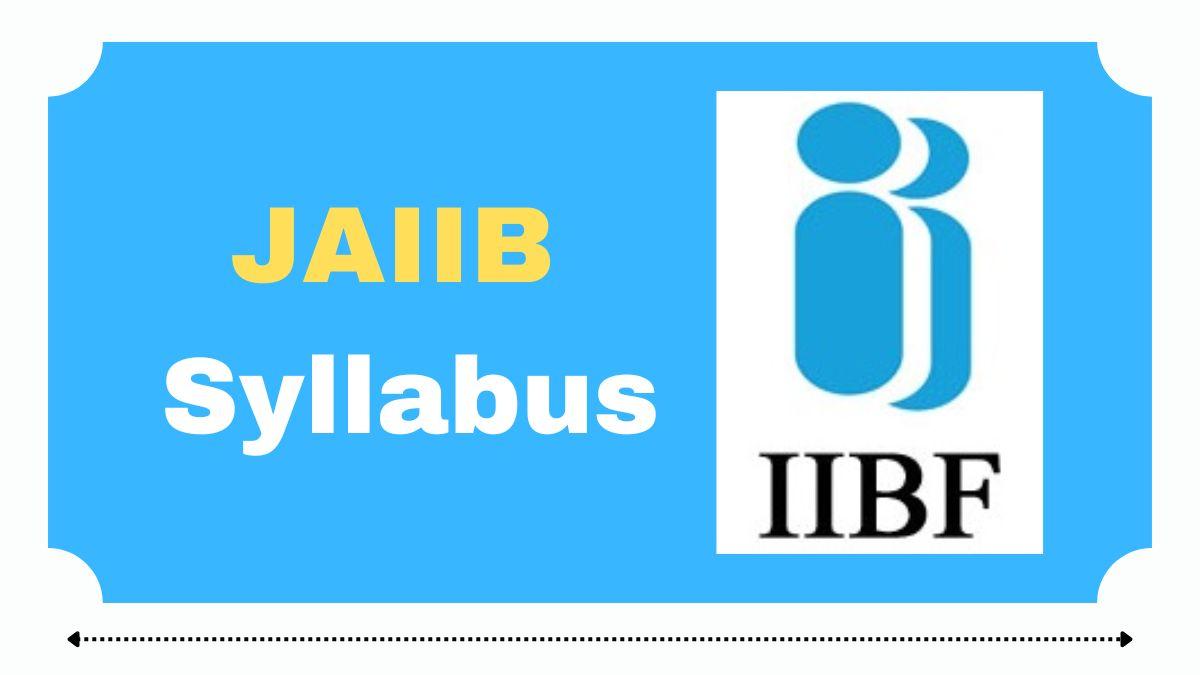

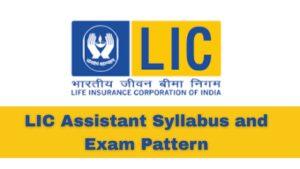 LIC Assistant Syllabus and Exam Pattern ...
LIC Assistant Syllabus and Exam Pattern ...
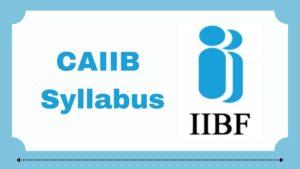 CAIIB Syllabus 2025 and Exam Pattern, Co...
CAIIB Syllabus 2025 and Exam Pattern, Co...
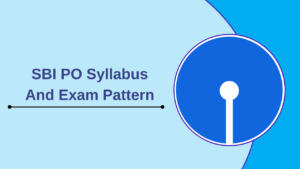 SBI PO Syllabus 2025 For Mains Exams, Do...
SBI PO Syllabus 2025 For Mains Exams, Do...



